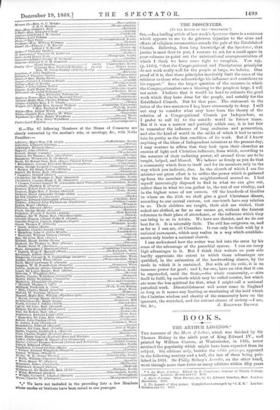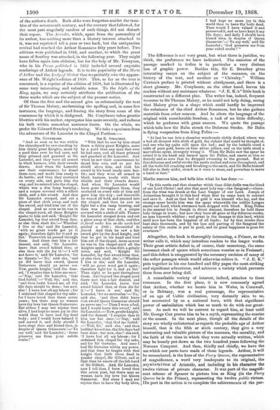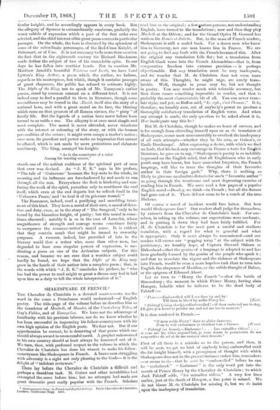BOOKS.
THE ARTHUR LEGENDS.*
THE romance of the Morte d' Arthur, which was finished by Sir Thomas Malory in the ninth year of King Edward IV., and printed by William Caxton, at Westminster, in 1485, never attained the popularity which might have been expected from its subject. Six editions only, besides the ed;tio princeps, appeared in the following century and a half, the last of them being pub- lished in 1634. Sir Philip Sidney's Arcadia, on the other hand, went through more than twice as many editions within fifty years • 1. La Monte et Arthur. Edited by E. Conybeare, Scholar of Trinity College, Cambridge. London: Moron and Co. PAS. 2. Merle arArthur. With Preface, &c., by Sir Edward Strachey, Bart. London: Macmillan. 1842.
3. The Legends of King Arthur. Compiled and arranged by "J. E. K." London: Strahan and Co. 1563. of the author's death. Both alike were forgotten amidst the trou- bles of the seventeenth century, and the century that followed, for the most part singularly careless of such things, did not disturb their repose. The Arcadia, which, apart from the personality of its author, has nothing more than a literary interest attached to it, was not reprinted till a year or two back, but the antiquarian revival had reached the Arthur Romances fifty years before. Two editions were published in 1816, and another, to which the great name of Southey was attached, in the following year. They might have fallen again into oblivion, but for the help of Mr. Tennyson, who in his Poems published in 1832 included several exquisite renderings of Arthur legends. It is to the popularity of the Morte d'Arthur and the Lady of Shalott that we probably owe the appear- ance of Mr. Wright's edition of 1858. This, as far as the text is concerned, is a reprint of the edition of 1638, but is illustrated by some very interesting and valuable notes. To the idylls of the King, again, we may certainly attribute the publication of the three works which are the subject of the present notice.
Of these the first and the second give us substantially the text of Sir Thomas Malory, modernizing the spelling and, in some few instances, the language, and freeing the story from some of the coarseness by which it is disfigured. Mr. Conybeare takes greater liberties with his author, expurgates him more severely, and reduces his bulk within somewhat narrower limits. On the whole, we prefer Sir Edward Strachey's rendering. We take a specimen from the adventure of Sir Lancelot in the Chapel Perilous :-
Ms. CONYBEARE.
"And as soon as ho was within the churchyard he saw standing by him thirty great Knights, more by a yard than ever he had seen, and they grinned and gnashed at Sir Lancelot, and they were all armed in black harness, with their swords drawn. And when Sir Lancelot saw their countenance he dread them sore, and made him ready to do battle ; and then they scattered on every side, and gave him the way, and he entered into the chapel, where was a dim lamp burning ; and a corpse covered with a silken cloth, and a fair sword. And then Sir Lancelot stooped, and cut a piece of that cloth away, and took the sword, and hied him out of the chapel. And as soon as he was in the chapel-yard, all those Knights spake to him and said, Knight Sir Lancelot, lay that sword from thee, or else thou shalt die.'—' Whether I live or die,' said Sir Lancelot, with no great words get ye it again ; therefore fight for it and ye list.' Therewith he passed through them. And there met him a fair damsel, and said, Sir Lancelot, leave that sword behind thee, or else thou wilt die for I will not leave it,' said Sir Lancelot, 'for no threats.'—' No,' said she, and ye did leave that sword, Queen Guinevere should ye never see. Now, gentle knight,' said the dam- sel, 'I require thee to kiss me once.' =Nay,' said Sir Lancelot, that God forbid.'—' Well, Sir,' said she, and thou hadst kissed me, all thy life days should be done ; but now, alas! I have lost all my labour ; for I ordained this chapel for thy sake ; for I have loved thee these seven years ; but there may no woman have thy love but Queen Guinevere. But sithen I may not rejoice thee alive, I had kept no more joy in this world than to have had thy dead body ; and I would have balmed it and served it, and daily should I have clept thee and kissed thee, in despite of Queen Guinevere.'—' Ye say well,' said Sir Lancelot ; 'Jesus preserve me from your subtle crafts !' " SIR E. STRACHEY.
"With that he saw by him stand there a thirty great Knights, more by a yard than any man that ever he had seen, and all these grinned and gnashed at Sir Lancelot. And when he saw their countenance he dread him sore, and so put his shield afore him, and took his sword in his hand ready unto bat- tle; and they were all armed in black harness, ready with their shields and their swords drawn. And when Sir Lancelot would have gone throughout them, they scattered on every side of him and gave him the way ; and therewith he waxed all bold, and entered into the chapel, and then he saw no light but a dim lamp burning, and then was he ware of a corpse covered with a cloth of silk. Thence Sir Lancelot stooped down and cut a piece away of that cloth, and then it fared under him as the earth had quaked a little ; therewithal he feared. And then he saw a fair sword girt by the dead knight, and that he got in his hand and hied him out of the chapel. Anon as ever he was in the chapel-yard all the knights spake to him with a grimly voice, and said, Knight Sir Lancelot, lay that sword from thee, or else thou shalt die.'—' Whether I live or die,' said Sir Lancelot, will no great word get it again ; therefore fight for it, and ye list.' Then right so he past throughout them. And beyond the chapel-yard there met him a fair damsel, and said, Sir Lancelot, leave that sword behind thee, or thou die for I leave it not,' said Sir Lancelot, for no entreaties.'—'No,' said she, and thou didst leave that sword Queen Guenever should ye never see.'—' Then I were a fool, and I would leave this sword,' said SirLancelot.—' Now, gentle knight,' said the damsel, 'I require thee to kiss me but once.'—' Nay,' said Sir Lancelot, 'that God me forbid.' —` Well, Sir,' said she, and thou haddest kissed me, thy life days had been done; but now, alas !' she said, have lost all my labour ; for I ordained this chapel for thy sake, and for Sir Gawaine. And once I had Sir Gawaine within my power, and that time he fought with that knight that lieth there dead in yonder chapel, Sir Gilbert, and at that time he smote off the left hand of Sir Gilbert, And, Sir Lancelot, now I tell thee, I have loved thee this seven year, but there may no woman have thy love but Queen linenever. But since I may not rejoice thee to have thy body alive, I had kept no more joy in this world than to have thy body dead. Then would I have valued it and preserved it, and so have kept it my life days ; and daily I should have kissed thee, in despite of Queen Guenever.'—' Ye say well,' said Sir Lancelot ; God preserve me from your subtil crafts !' "
The difference is not very great, but what there is justifies, we think, the preference we have indicated. The omission of the passage marked in italics is in particular a very distinct loss of graphic power. Besides this, Sir E. Strachey gives interesting essays on the subject of the romance, on the history of the text, and another on "Chivalry." William Caxton's preface is printed without abridgment, and there is a short glossary. Mr. Conybeare, on the other hand, leaves his readers without any assistance whatever. "J. E. K.'s" little book is constructed on a different plan. The writer has, indeed, frequent recourse to Sir Thomas Malory, as he could not help doing, seeing that Malory gives in a shape which could hardly be improved the substance of the chief Arthur Romances, but he also gathers materials from other sources. And he alters the language of the original with considerable freedom, a task of no little difficulty, which he performs with great success. We quote the passage which tells how Sir Rain struck the Dolorous Stroke. Sir Balin is flying weaponless from King Pelles :— " At last he ran into a chamber wondrously richly decked, where was a bed all dressed with cloth of gold, the richest that could be thought of, and one who lay quite still upon the bed ; and by the bedside stood a table of pure gold, borne on four silver pillars, and on the table stood a marvellous spear, strangely wroug'it. When Sir Balm saw the spear he seized it in his hand and turned upon Sir Pelles, and smote at him so fiercely and so sore that he dropped swooning to the ground. But at that dolorous and awful stroke the castle rocked and rove throughout, and all the walls fell crashing and breaking to the earth, and Sir Balin himself fell also in their midst, struck as it were to stone, and powerless to move a hand or foot."
Merlin rescues him, and tells hint what he has done
"In this castle and that chamber which thou didst defile was the blood of our Lord Christ ! and also that most holy cup—the Sangreal—where- from the wine was drunk at the Last Supper of our Lord. Joseph of Arimathea brought it to this land when first he came here to convert and save it. And on that bed of gold it was himself who lay, and the strange spear beside him was the spear wherewith the soldier Longus smote our Lord, which evermore hath dripped with blood. King Pellea is the nearest kin to Joseph in direct descent, therefore he held these holy things in trust ; but now they have all gone at thy dolorous stroke, no man knoweth whither ; and great is the damage to this land, which until now has been the happiest of all lands ; for by that stroke thou haat slain thousands, and by the loss and parting of the Sangreal the safety of this realm is put in peril, and its great happiness is gone for evermore."
Altogether, the book is thoroughly interesting, a Primer, as the writer calls it, which may introduce readers to the longer works.
Their great artistic defect is, of course, their monotony, the same incessant clash of spears which sometimes wearies us in Froissart ; and this defect is exaggerated by the necessary excision of many of the softer passages which would otherwise relieve it. "J. E. K." puts together in his one hundred and fifty pages the most striking and significant adventures, and achieves a variety which prevents them from ever being dull.
A remarkable variety of interest, indeed, attaches to these romances. In the first place, it is now commonly agreed that Arthur, whether we locate him in \Vales, in Cornwall,
or in Brittany, was a real personage, the representative of an age of Celtic civilization, very distantly akin to us, but accounted by us a national hero, with that significant power of assimilation which has so much to do with our great- ness. As such we will be content to regard him, at least until Mr. George Cox proves him to be a myth, representing the sunrise or the sunset. In the next place, though all the details of the story are wholly unhistorical as regards the probable age of Arthur himself, that is the fifth or sixth century, they give a very interesting and valuable picture of the manners, the morality, and the faith of the time in which they were actually written, which may be loosely put down as the two hundred years following the Norman Conquest. And then, thirdly and chiefly, we have the use which our poets have made of these legends. Arthur, it will be remembered, is the hero of the Faery Queene, the representative of magnificence, a word very inadequate to its original, the PriciApirpiguz of Aristotle, and including in his character the twelve virtues of private character. It was part of the magnifi- cent scheme of Spenser to picture him as King (in the Faery Queene he is the Prince), representing the twelve public virtues. His part in the action is to complete the achievements of the par- ticular knights, and he accordingly appears in every book. But the allegory of Spencer is extraordinarily cumbrous, probably the worst vehicle of expression which a poet of the first order ever selected, and the chief interest of his great poem centres in particular passages. On the whole, the hero is obscured by the splendour of some of the subordinate personages, of the Red-Cross Knight, of Britomart, or of Una. It is not necessary to ao more than mention the fact that in the eighteenth csutury Sir Richard Blackmore made Arthur the subject of two of his unreadable epics. In our days he has fallen into worthier hands. Not to mention Mr. Matthew Arnold's beautiful Tristram and Iseult, we have Lord Lytton's King Arthur, a peens which the author, we believe, regards as his masterpiece, but which, though it contains passages of great eloquence, the public has refused to estimate highly. The Idylls if the King, not to speak of Mr. Tennyson's earlier poems, stand by common consent on a different level. It is not indeed easy to find a parallel to them in literature, though some resemblance may be traced in the 2Eneid, itself also the story of a national hero, and with a great moral on its face, the blessing which rests on that greatest of all Roman virtues, the " piety" of family life. But the legends of a nation have never before been turned to so noble a use. The allegory is at once most simple and most complete. The moral is never obtruded, never interferes with the interest or colouring of the story, or with the human personalities of the actors ; it might even escape a reader's notice ; once seen, its grandeur and power make an impression that cannot be effaced, which is not made by more pretentious and elaborate machinery. The King, amongst his knights "As is the conscience of a saint Among his warring souses," stands one of the noblest emblems of the spiritual part of man that ever was devised. As "J. E. K." says in his preface, "The tale of 'Guinevere' becomes the key-note to the whole, its meaning and its influence_ are foreshadowed by and made to run through all the rest. Everywhere the flesh is hindering and con- fusing the work of the spirit, powerless only to overthrow the soul itself, which even at the end departs but to refresh itself in the Unknown Peace,' and to heal it of its grievous wound.'" The Romances, indeed, need a purifying and ennobling treat- ment of this kind. They have a moral of their own, a moral of devo- tion and duty, even, as in the story of "The Sangreal," only to be found by the blameless knight, of purity ; but this moral is some- times obscured ; notably it is so in the case of Lancelot, whose magnificence of strength and courage seems sometimes fairly to overpower the romance-writer's moral sense. It is evident that they contain much that might be turned to unworthy purposes. A rumour, indeed, has prevailed of late in the literary world that a writer who, more than other men, has degraded to base uses singular powers of expression, is me- ditating a poem on one of the Arthurian subjects. For this reason, and because we are sure that a worthier subject could hardly be found, we hope that the Idylls of the King may grow in the bands of their author into a complete poem ; that, in the words with which "J. E. K." concludes his preface, he "who has had the power to read aright so great a dream may feel it laid upon him as a duty to tell the whole interpretation of it."








































 Previous page
Previous page